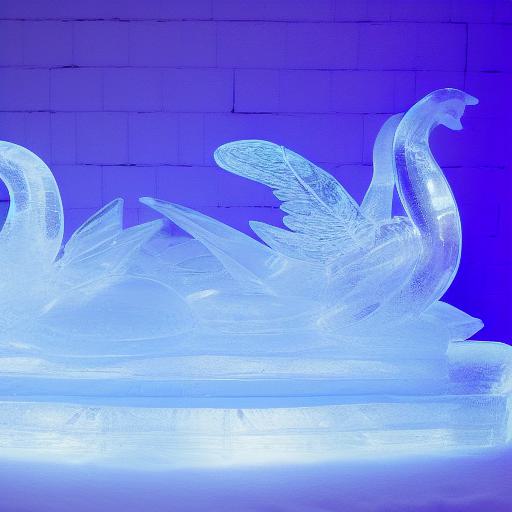How to write this prompt?
How the individual parts of the prompt contribute to the image generated by an AI model.
- “An tranquil ice sculpture” – This sets the scene for the image as being an art piece made of ice. The use of the word “tranquil” suggests a peaceful or calming atmosphere, which could influence the color palette or composition of the image.
- “Of two glowing ice-made swans” – This provides a clear focus for the image, as the AI model will be generating a depiction of two swans made of ice. The use of the word “glowing” adds an additional element of interest, suggesting perhaps that the swans are lit from within or that they are glowing in the moonlight.
- “On a wave, in a party” – This adds context to the image, suggesting that it is part of a larger scene or event. The mention of a wave could influence the composition of the image, as the swans may be depicted floating on a body of water. The mention of a party could suggest additional elements to include in the image, such as people or other decorations.
- “An ice sculpture by Susan Heidi” – This provides credit to the artist who created the original ice sculpture, and could influence the style or aesthetic of the image being generated.
- “Pixabay, art deco, ice sculpture, swan, wings of a swan” – These are additional keywords or tags that could help the AI model understand what kind of image to generate. “Pixabay” suggests that the image should be similar in style to other images found on the Pixabay platform. “Art deco” could influence the overall aesthetic of the image, with its geometric shapes and bold colors. “Ice sculpture” and “swan” provide further detail about the subject matter, while “wings of a swan” suggests a specific focus on the wings of the ice swans.
Taken together, these individual parts of the prompt help to guide the AI model in generating an image that fits the description provided. Each element provides additional context or detail that helps the model understand what kind of image to create, from the overall atmosphere to the specific details of the ice swans and their environment.
What is the history of art deco style in ice sculptures?
Art deco style originated in the 1920s and 1930s, and was characterized by its use of geometric shapes, bold colors, and streamlined designs. Ice sculptures in this style often feature sharp edges and angular forms, with a focus on symmetry and repetition. While the use of ice as a medium for art dates back centuries, the combination of ice sculpture and art deco style is a relatively recent development.
How to make an ice sculpture of a swan?
To make an ice sculpture of a swan, you will need a large block of ice and a set of sculpting tools. Begin by sketching out the basic shape of the swan on the surface of the ice block, using a marker or spray paint. Then, use a chainsaw or other cutting tool to rough out the basic shape of the swan. From there, use chisels and other sculpting tools to refine the details of the swan, including its wings, neck, and head. Be sure to work carefully and slowly, using a spray bottle filled with water to smooth out any rough spots as you go.
Why is ice a popular medium for sculptures?
Ice is a popular medium for sculptures because of its unique properties. Unlike other materials like stone or wood, ice is transparent and can be lit from within, creating a striking effect in low light. It is also relatively easy to carve, allowing sculptors to create intricate details and delicate shapes. However, working with ice does require some specialized knowledge and tools, as the material can be fragile and difficult to work with in warm temperatures.
Can I sell AI-generated art?
Yes, it is possible to sell AI-generated art, but there are some legal and ethical considerations to keep in mind. In most cases, the copyright for an AI-generated artwork belongs to the person or organization that created the AI model or provided the input data. If you are using an AI tool or platform to generate art, be sure to review the terms of service and any licensing agreements to ensure that you are allowed to sell the resulting artwork. Additionally, it is important to consider the ethical implications of selling art that was created without direct human input. Some people may argue that AI-generated art lacks the creativity and originality of human-made art, and may be less willing to purchase such pieces.
Can AI art generation prompts be used for commercial purposes?
Yes, AI art generation prompts can be used for commercial purposes, but it is important to ensure that you have the right to use any images or artwork that are generated as a result. If you are using a platform or tool to generate AI art, be sure to review the terms of service and any licensing agreements to ensure that you are allowed to use the resulting artwork for commercial purposes. Additionally, if you are providing AI art generation services to clients, it is important to be transparent about the fact that the artwork was created using AI technology. Some clients may prefer human-made art or may be hesitant to pay for artwork that was generated by a machine.
Enhance your designs with stunning AI-generated art using Visual Paradigm Online. With just a few clicks, you can incorporate unique and visually appealing graphics into your projects, thanks to the platform’s user-friendly interface and a wide selection of design templates and assets. Experiment with various styles and layouts until you achieve the perfect combination for your needs. Try Visual Paradigm Online today and take your designs to the next level!


